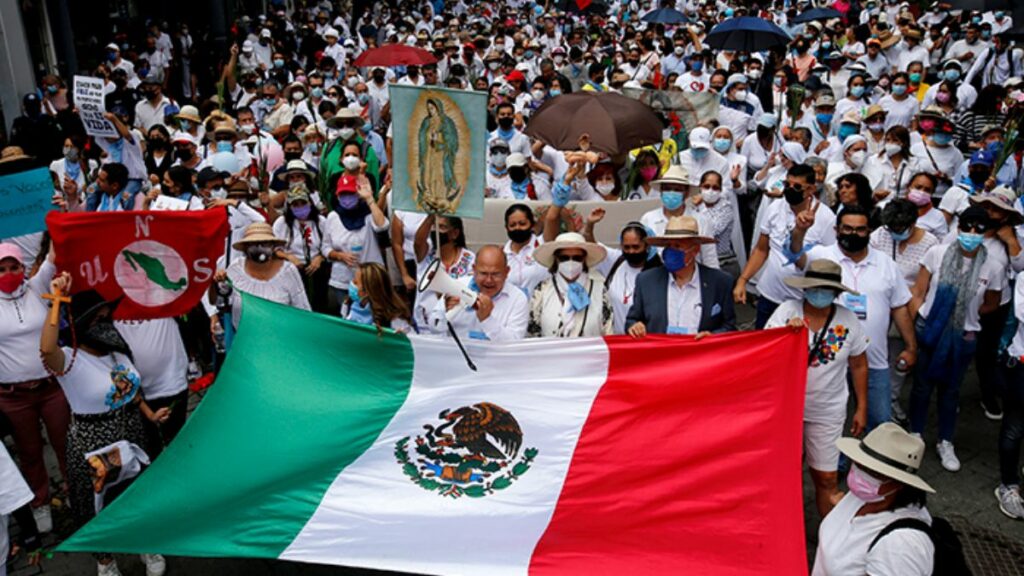It’s Monterrey, Mexico. Abortion isn’t legal. A med student launches a pro-life club at his public university. The university administration forces them to stop the club, stating that they can’t talk about abortion. The club president, Rodrigo García, turns to the media. After about two months, the university reinstates the club.
When I met Rodrigo in the cafeteria at the Mexico City expo center recently hosting the World Congress of Families, what Rodrigo told me next surprised me the most. After his courageous stand in the media, now that the club was reinstated, the club is focusing on homelessness, poverty, and other issues unrelated to the topic of abortion. Why? Fear of more retaliation from the university if the club directly focused on abortion.
Rodrigo’s story isn’t uncommon. It’s actually the norm in Mexico and across Latin America. When our team of Pro Life Global visited Bolivia in July, we met with a pro-life TikTok influencer. Despite the fact that abortion isn’t legal in Bolivia (with a few exceptions), this influencer asked to remain anonymous because she has received threats from her university professors that she may not be able to graduate from her social studies program if she continues speaking up publicly for life.
When students like Rodrigo and the Bolivian TikTok influencer encounter pressure and censorship, they nearly always give up, Mexican sociologist Cristina Rodriguez pointed out to me while we ate tostadas in a local Mexican café. “They are scared and don’t know what to do. Their university shuts down the club. They know that the legal process will be nearly impossible. The only option they have is to turn to the media, but without support and direction on how to do this effectively, they give up.”
Rodrigo fought back, largely because his university group is a part of the leading Mexican pro-life youth organization, Juventud y Vita (Juvi), which is present in 16 cities across the country. However, Rodrigo’s group is the only Juvi pro-life university group – he wants to change this, but with his own class schedule and local pro-life student leadership commitments, it’s hard to find the time. Whether more pro-life university groups are active in Mexico remains a mystery; the pro-life leaders I met didn’t know of more whose leadership hadn’t yet given up.
But it’s not just the university administration which makes speaking for life as a student hard. “Most of my classmates are pro-choice,” said Fatima, a university student at a Catholic university in Anahuac Queretaro, Mexico. “The university administration doesn’t want students to talk about abortion for fear that pro-abortion students will present better arguments than the pro-life ones and that more students will be swung to the pro-abortion position.”
Of course, this is horrible. No one should be afraid of discussing abortion, especially not those who believe that every life is valuable because we have science, facts, logic, and compassion on our side.
This bleak situation is the result of a disconnected global pro-life movement. There are pro-life organizations which do media training and provide legal counsel. There are fabulous pro-life training organizations. But they aren’t connected to the students on the ground.
Events like the World Congress of Families in Mexico City last weekend are helpful in bringing together leaders so that we can combine forces. They’re just one step in creating an interconnected movement, similar to what Planned Parenthood Global is leading. Planned Parenthood Global is partnering with over 70+ organizations to “back the brave”. They’re bringing young activists to the center and equipping, mentoring, and funding them to advocate for abortion and remove protections for the preborn and their moms across Africa and Latin America. Mexico is one of their eight focus countries.
Over breakfast last weekend, I met the school administrator from the Catholic university network which includes the university that Fatima attends. He is excited to work with Pro-Life Global to train their students how to advocate for life and start pro-life clubs – he said that it was an answer to prayer to meet me. Fatima also said that she’d love us to help her launch a pro-life club at her university.
We also made plans with the Juvi team to train the leaders of each of their city groups on the best practices to change hearts and minds on abortion in a non-confrontation fashion and then provide them with the tools so that they can in turn train each of the members in their groups.
If we want to reverse the global wave of abortion legalization, we must create a locally led, globally connected pro-life movement which actively mentors and equips local student activists with the best practices, media training, and legal background to overcome the censorship, discrimination, and threats they face daily.
This is why a small team of international pro-life student activists launched Pro-Life Global one year ago. There’s a lot of work to be done and a long way to creating an abortion-free world, but every day that students like Rodrigo are given the support and direction they need to stand boldly for life in media, with their administration, and with their classmates, the world gets one step closer to a home where every mom and their child has the help and support they need to not just choose life, but thrive.
